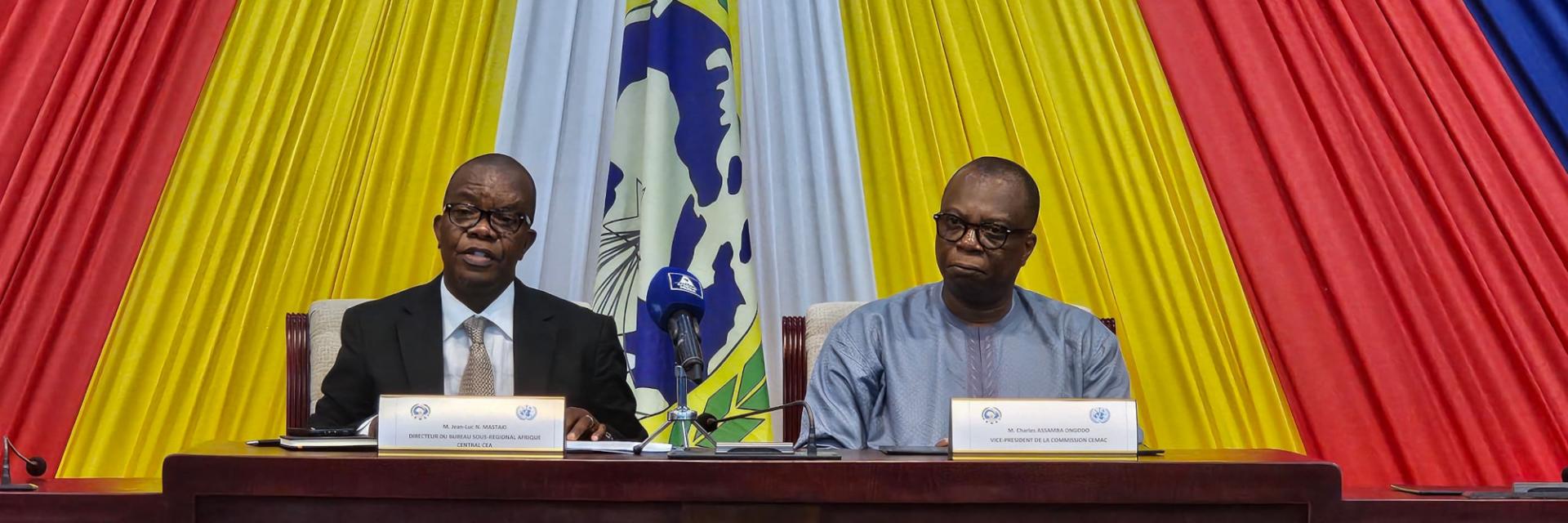Malabo, July 03, 2024 (ECA) - "At the end of our discussions, we hope that the fruits will keep the promise of the flowers for this new-generation collaboration that is opening up for ECA and the CEMAC Commission, not only for the Industrialization Plan and AfCFTA, but also for all the other areas of cooperation marked out during our retreat," concluded Ngabo Seli Mbogo, Commissioner in charge of the Common Market, on behalf of the CEMAC Commission Chairperson.
At the close of the CEMAC-ECA Retreat, which ended on July 3, 2024 in Malabo, the main resolution is the forthcoming signing of the Memorandum of Understanding (MoU) by the highest authorities of the CEMAC Commission and the United Nations Economic Commission for Africa. The areas of cooperation that are to underpin this collaboration framework were validated. These include the harmonious development of special economic zones in the sub-region drawing on the successful experience of South-East Asia, the establishment of a financing mechanism for industrialization with no harmful impact on debt, the development of a common agricultural policy, the strengthening of quality infrastructure, capacity-building for CEMAC economists and experts on macroeconomic policy frameworks integrating the development dimension in one hand, and on natural capital and the carbon credit market in the other; and support in responding to the skills gap in the development of value chains, particularly in the timber and forestry sectors, development of digital solutions as part of industrialization policies.
The CEMAC Commission and the Sub-Regional Office for Central Africa of the United Nations Economic Commission for Africa will deploy their joint commitment based on two flagship documents: the Master Plan for Industrialization and Economic Diversification in Central Africa (PDIDE AC) and the Report on Import-Substitution and Quality Infrastructure resulting from the 2023 Intergovernmental Committee of Senior Officials and Experts in Bujumbura. According to Jean Luc Mastaki, Director of the ECA's Sub-Regional Office for Central Africa, "the PDIDE-AC as a sub-regional industrial strategy puts us in tune with the import-substitution strategy adopted by our Heads of State on March 17, 2023. The development of regional value chains through special economic zones will enable the sub-region to end with import dependency and its effect on external stability, exposure and fragility to exogenous shocks, the skills gap and the depth of youth unemployment, and defensiveness in the face of opportunities such as the African Continental Free Trade Area (AfCFTA)".
The number of participants in the continental African market is growing. South Africa and Botswana have joined the Guided Trade Initiative, the experimental phase of trade under the AfCFTA. The AfCFTA Secretariat has announced a further 24 countries by the end of the year. Actually, only Cameroon in Central Africa is trading and has carried out two operations under AfCFTA preferences. ECA has provided Central Africa with a regional strategy, following support for its 8 member states to adopt national strategies.
As a customs union, the 6 CEMAC countries have submitted consensual schedules of tariff concessions and schedules of specific commitments. To boost their active participation in the AfCFTA, the new collaboration will be based on the implementation of national and sub-regional strategies for the implementation of the AfCFTA within the six CEMAC countries, the revitalization of dialogue with the CEMAC private sector and support for the emergence of regional champions, the joint production of the trade monitoring report designed to disseminate trade statistics, measure intra-Community trade and evaluate the implementation of the AfCFTA.
For the CEMAC Commission, "the implementation of a mechanism to take into account the informal sector in intra-Community trade is vital. This would better reflect the reality of cross-border flows and enable us to capture a niche that needs to be strengthened in order to derive maximum benefit from the CAFTA," said Francial Baudin LIBENGUE DOBELE-KPOKA, CEMAC Commissioner for Infrastructure and Sustainable Development.
For ECA, the diversification and industrialization of Central African economies must be driven by trade. However, without manufacturing products, economic integration will remain low, and countries will not be able to recoup their investment in joining the AfCFTA. Hence Jean Luc Mastaki's appeal: "The economies of the sub-region must develop their comparative and competitive advantage and increase their strategic positioning within the african single market. They must develop the Made in Central Africa label through high and very high value-added products to win and consolidate market shares. Our report on import-substitution provides innovative recommendations in terms of packaging, naming and geographical indications, which could help develop a Central African identity in the single African market".
All in all, through the CEMAC-ECA partnership, happy prospects are opening up for a sub-region that offers greater opportunities to its people. As Jean Luc Mastaki emphasized, "At ECA, we firmly believe in our very special partnership with CEMAC and its member states, and remain focused on pursuing our shared vision of building an integrated and prosperous Central Africa".
Media queries
Zacharie Roger MBARGA - Communications Officer
United Nations Economic Commission for Africa
637, rue 3.069, Quartier du Lac, Yaoundé, Cameroon
Tel: +237 222504348
Email: zacharie.mbargayene@un.org

